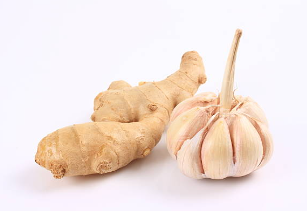Ginger and garlic are two of the most common ingredients sure to be found in many Nigerian kitchens. They have gained much attention over the years thanks to their numerous health benefits. Traditionally, garlic and ginger have been used as home remedies for many ailments. While they each have incredible health benefits when used independently, using them together is a sure way of getting more. They can be combined in dishes like stews and soups or boiled with other ingredients to make tea.
In Nigeria, mixing ginger and garlic with dried red chili peppers is one of the most common ways of using ginger band garlic. In this post, we’ll talk about some of the health advantages of eating ginger and garlic as well as the side effects associated with consuming too much of them.
Table of Contents
Health Benefits of Ginger
Zingiber officinale, also referred to as ginger, is a flowering plant with Southeast Asian ancestry. It is among the spices with the most health benefits in the world. This delicious and incredibly healthy spice can be used fresh, dried, powdered, or in oil. Due to its high gingerol content, ginger has been widely used as a home remedy for many diseases over the centuries. Here are some of its health benefits:
Read also: HABITS TO PRACTICE TO MAINTAIN A HEALTHY LIFESTYLE IN NIGERIA
Studies have shown that ginger is loaded with antioxidants, compounds that prevent the body against diseases like various types of cancers, heart diseases, and high blood pressure. In addition, ginger can effectively lower blood sugar levels when consumed in moderation. So adding a cup of ginger tea to your breakfast will be a fun way to boost your immunity.
In addition, records show that ginger effectively treats nausea and vomiting, especially morning sickness. According to some research, ginger helps in calming nausea by enhancing digestion. While no record suggests any harmful effects associated with eating ginger during pregnancy, Before taking ginger as a natural treatment for morning sickness, it is usually a good idea to talk to your doctor.
Eating ginger may aid in weight loss. Studies have shown that gingerol, which is the main compound contained in fresh ginger, has anti-obesity effects. It helps your body digest food faster and encourages quickly dispatching digested food through the colon. Furthermore, ginger is known to suppress hunger and helps relieve indigestion. It is typically used with other ingredients like cinnamon, lemon, or turmeric if the goal is to lose weight.
Read also: 10 IMPORTANT REASONS FOR STAYING FIT IN YOUR EVERYDAY LIFE AS A NIGERIAN
Another great health benefit of consuming ginger is its ability to reduce menstrual pain. Due to its anti-inflammatory effect, which is accomplished by preventing the body’s production of prostaglandins, ginger has proven to be quite effective in easing menstrual cramps and period pain, as menstrual cramps appear to be caused by the excessive production of prostaglandins.
Side Effects of Ginger
Consuming one to two milligrams of ginger daily is generally well tolerated by the human body. However, a few adverse effects, like diarrhea, heartburn, and stomach upset, have been associated with consuming ginger in larger amounts. In more severe cases, excessive consumption of ginger may increase the risk of miscarriage in pregnant women.
Read also: AVOID KIDNEY FAILURE: 5 REASONS YOU NEED TO STOP TAKING HERBAL CONCOCTION (AGBO)
Health Benefits of Garlic
Native to Central Asia, Allium sativum, locally known as garlic, is one of the healthiest vegetables on earth. Thanks to its sweet, pungent flavour, garlic is typically used as a spice even though it is botanically classified as a vegetable. Because of its impressive health benefits, adding a few cloves of garlic to your cooking is a sure way of spicing up your dishes while eating healthier at the same time. Much like ginger, it can be used fresh, dried, and in oil or powdered form. Some of the health benefits that have been associated with eating garlic are:
According to research, garlic helps lower blood pressure in hypertensive patients. A few studies have found that garlic is as effective as some standard blood pressure-lowering medications while having fewer side effects. A compound known as Allicin is released when fresh garlic is crushed or chopped. As reported by some studies, this compound helps lowers blood pressure by making it easier for blood to flow freely.
Have you found this post helpful? What is the next step you are planning to take? We can connect on Whatsapp and talk about it.
This is attained by preventing the production of angiotensin II, a compound that causes blood vessels to contract. Thereby increasing blood pressure. In addition, Allicin is also a powerful antibiotic with antibacterial and antifungal properties.
Garlic is highly effective in treating cough and the common cold. Perhaps the most popularly known health benefit of garlic in Nigeria, Nigerian mothers have a long history of feeding their children garlic as a cure for cough and the common cold. In addition to relieving the symptoms, eating garlic may reduce your risk of getting sick.
Additionally, another impressive health benefit of garlic is that it promotes cardiac health by lowering cholesterol levels. Research has shown that garlic helps reduce the risk of diseases like heart attack and stroke by regulating cholesterol levels. A Series of studies have concluded that this is possible because of the ability of garlic to act as an anticoagulant. That is, platelets are less likely to form big lumps and pile up on the artery’s walls.
Garlic is also considered a rich, low-calorie vegetable that contains a lot of nutrients that are necessary for a balanced diet. These include Vitamins (C, K, B12, D, A, etc.), Minerals (Calcium, Zinc, Sodium, Phosphorous, etc.), Protein, Fats, Carbohydrates, and other nutrients that are essential for the proper functioning and development of the body.
Side Effects of Garlic
Despite having many health benefits, overeating garlic has been known to cause bad breath, body odour, heartburn, and some minor digestive issues like gas and bloating. In addition, due to its antithrombotic properties, the ability to stop blood from forming clots, overeating garlic while taking blood thinners may lead to an increased risk of bleeding. It is significant to remember that there are no reliable medical guidelines on the daily intake of garlic.
Do you love this content? You can subscribe to our newsletter for more updates. You can also directly connect with us through our Whatsapp community.
About the Author
Hi, my name is Asiya. I’m a freelance creative writer and blogger that enjoys writing about products, lifestyle and real estate. I love writing, baking and being a mom.
About Author
- Op-Ed are articles published by guest authors. We no longer accept guest posts. However, we are still open to adding long-term content contributors to our team of insightful writers. To write for us, please check out inisght.ng/guest-post.
Latest entries
 TechnologyOctober 2, 2023URL Shortener: Useful Examples and Why You Need It
TechnologyOctober 2, 2023URL Shortener: Useful Examples and Why You Need It TechnologySeptember 2, 2023Top 7 Meme Generators to Spice Up Your Content Creation Process
TechnologySeptember 2, 2023Top 7 Meme Generators to Spice Up Your Content Creation Process CampusSeptember 1, 2023A Comprehensive Guide to Choosing the Right University Course in Nigeria
CampusSeptember 1, 2023A Comprehensive Guide to Choosing the Right University Course in Nigeria Business InsightsAugust 24, 2023Building a Portfolio Website: The Ultimate Guide
Business InsightsAugust 24, 2023Building a Portfolio Website: The Ultimate Guide

